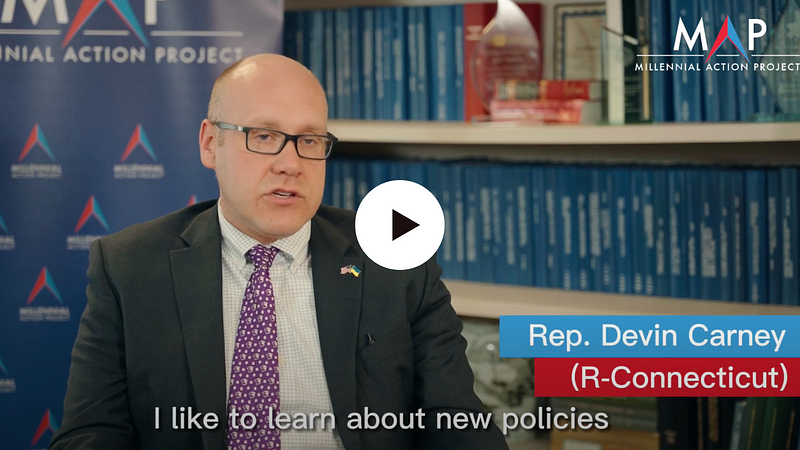ON THE RISE — REP. DEVIN CARNEY (R-CT)
May 23, 2023
On the Rise is a year-long series leading up to MAP’s ten year anniversary. The series features profiles of Millennial and Gen Z legislators in the Millennial Action Project’s State Future Caucus Network (SFCN) network. The SFCN is a bipartisan network of young elected officials that engages with over 1,600 legislators across the country to work on future-oriented policy solutions. Future Caucus members are committed to pragmatically working toward a culture of political cooperation.
In a recent interview, Rep. Devin Carney, Republican co-chair of the Connecticut Future Caucus, opened up about his experience and policy work as bridge-builder in the Connecticut General Assembly. Read on to learn more about how Rep. Carney works across party lines to advance legislation his constituents care about!
Who is Rep. Carney?
“I am State Representative Devin Carney and I represent Lyme, Old Lyme, Old Saybrook and Westbrook in the Connecticut General Assembly. I’m in my fifth term. I serve on the transportation, finance, and education committees and I’m in leadership in the minority caucus serving as the House Republican policy co-chair this legislative session. In 2021, I was named Millennial Action Project’s Republican Rising Star that year, and I am very focused on trying to make Connecticut a more attractive place for young people.”
Tell us about your district and constituents — what are the key issues that are important to them?
“In my district, the big things are certainly taxes and jobs, and another huge one is education. I went to public schools in my district in Old Saybrook and think public schools are great, so that’s definitely something that myself and others in my district care about. I’m sure you see my [Zoom] background, that’s the Old Saybrook breakwater lighthouse. My district is right on the water, along the Long Island Sound and the Connecticut River. The geographic location of my district makes the environment an extremely important issue to the district. And lastly, tourism is very important, because we do get a lot of summer people either as part time residents or folks coming to go to the beach, go to restaurants, go see sights, things like that. Overall, there are a lot of important issues to juggle.”
What is your advice to young people who would want to get involved in politics or in their state?
“Sure, so first and foremost — right on! I want to see more young people get involved in politics. I think specifically in the policy process, a lot of young people see things on social media, and maybe get a hint of what is going on, but it’s so important to actually delve into the issues and inner workings of government. So my hope and advice is to consider running for office — whether it’s at the state level, national level, or the local level, and get involved in their communities in any way. Do not sit on the sidelines. It’s very easy to sitback, express opinions, and criticize or support legislation. But the real importance lies in actually getting involved in this process if you really want to make change.”
Where have you found opportunities to build bipartisan relationships and find common ground on issues? Have you faced any challenges?
“I think it’s easier to find common ground on issues related to jobs, college education, affordability, stuff like that… It is a very polarized political environment, unfortunately; and it’s grown more polarized over the years… In that sense, it can be difficult at times, not because of anything we’re necessarily doing in the legislature, but more the sentiments of folks, whether it’s in the media or national party politics, things like that. That’s where the real challenges are. However, we do often find common ground in the legislature around issues affecting young people finding jobs, younger people being able to afford homes, younger people wanting to come back to Connecticut. The truth is we agree a lot more than we disagree on issues, and probably most people would be surprised to hear that considering how things are reported, particularly on the national level.”
How do you stay connected to your constituents to represent their needs in the General Assembly?
“I tried to be in my district as much as possible. I work there. live there, dine there, go to shows there… I also have office hours down there, and try to be very accessible to anyone. I go to as many events as I can, and really try to make people aware that they can contact me with any issues whether it has to have legislation or a state agency or anything like that. I’m here and happy to help.”
In your experience, what are the most valuable lessons you have learned about collaboration? How do you envision these lessons shaping your future endeavors as a public servant?
“The most valuable lessons I have learned in the state legislature have been from the people I have met along the way. In working to try to find common ground with folks, I have worked and built relationships with people I have never thought I would find common ground. Furthermore, working with people from different areas and different backgrounds have made me learn to seek understanding to understand where others are coming from. I think that was a really valuable thing that I’ve been fortunate enough to be able to learn since I’ve been a state legislator. You know, I come from a certain area that’s very different from other areas in the state, so being able to learn from my colleagues has been really valuable.”
Finally, who has better pizza?
“I mean… this is tough. I do like New York’s pizza, but I have to go with Connecticut. It’s the best in the country.”







Join 1,900+ BIPARTISAN LEADERS NATIONWIDE
Be a part of a network of lawmakers committed to governing effectively, passing more representative public policy, and increasing public trust in democracy.